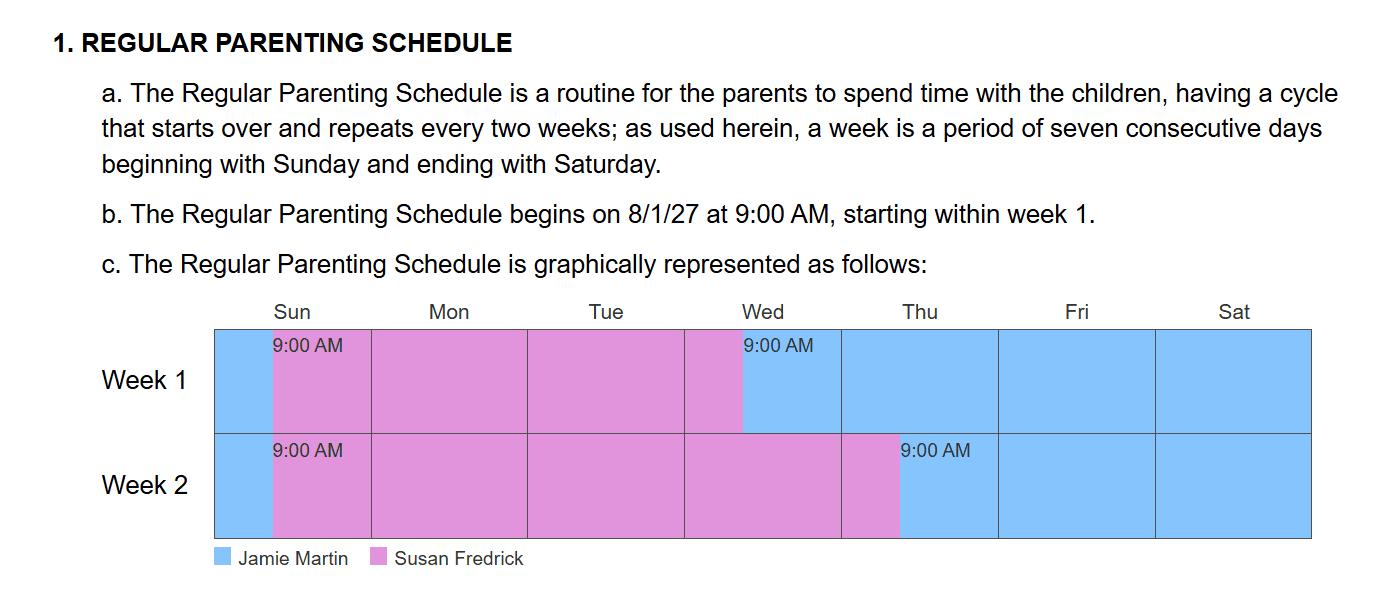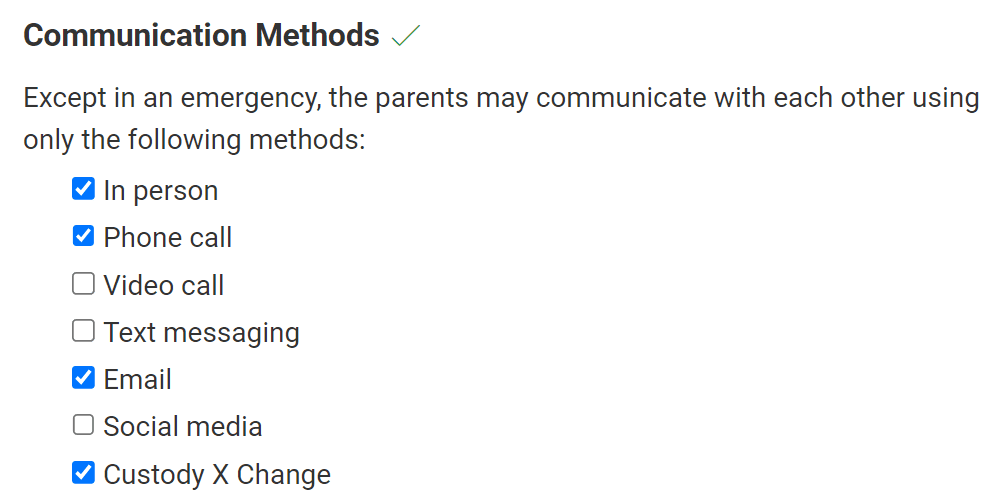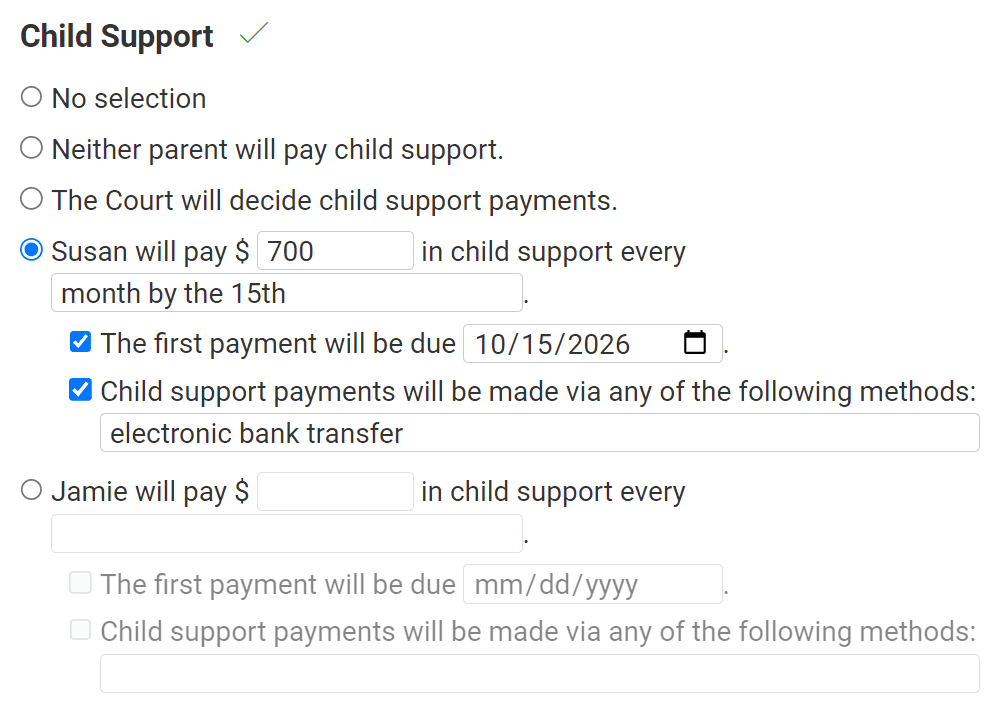Newfoundland & Labrador Parenting Plans (Custody Agreements)
Parenting plans (sometimes called custody agreements) spell out how parents are to co-parent their children. You must create a parenting plan even if you don't agree with the other parent about how to parent apart. The following will help you prepare one.
Parents in Newfoundland and Labrador who agree have two options to handle their agreement — keep it between themselves or get a consent order. Parents who disagree each propose a parenting plan to the court with the terms they believe are best for the child.
Parenting plan template
In Newfoundland and Labrador, parents can choose any parenting plan template or create their own format.
Parents who just want to cover the basics of a plan can use the Government of Canada's parenting plan tool to create theirs. However, the plan will come in the body of an email rather than a structured document.
If you want to cover more ground and get an organized, printable document, use the Custody X Change parenting plan template. Choose from over one hundred provisions, and create your own provisions if you like. With one click, add a signature section for each parent and a witness if you want your plan to become a legally enforceable agreement.
 Try this with Custody X Change.
Try this with Custody X Change.
Required terms
Your plan must cover the following. All terms must be in the child's best interests.

Parenting time arrangements
Parenting time is the time parents have the child in their care.
When your plan gives one parent primary parenting time, the child will spend more than 60 percent of the year in the care of that parent.
When your plan gives parents shared parenting time, the child will spend at least 40 percent of the year in each parent's care.
You can include a parenting time schedule, setting out where the child will be day to day and during holidays and special occasions. Or you can simply state that parents will have "general parenting time" without following a set schedule.

You may also detail:
- Who will transport the child to and from visits
- Whether parents must ask each other to watch the child before asking anyone else (called the right of first refusal or right of first option)
- How to handle schedule changes (e.g., how much notice a parent must give if they must miss a visit)
- How to handle makeup parenting time

Decision-making responsibility
Decision-making responsibility is the authority to make major child-related decisions. Say whether both parents will have a say or only one parent.
You may also detail:
- Whether you'll split decision-making responsibility by topic (e.g., one parent makes all decisions about the child's sports)
- Matters that won't require parents' agreement (e.g., curfew during each parent's parenting time)
- What you'll do when parents can't agree on a matter that requires mutual consent (e.g., go to mediation)

Communication
Co-parents need to communicate in order to make decisions about the child, discuss schedule changes and more.
In your plan, specify the methods parents will use to stay in touch with one another. It's also a good idea to require parents to provide one another with up-to-date contact information if appropriate.

You can go into more detail, stating whether:
- Parents will receive at least one call from the child during each other's parenting time.
- Parents must communicate civilly and respectfully.
- Parents must not discuss non-parenting matters.
- Parents can post videos and photos of the child on social media.
Child support
Child support ensures both parents are contributing to the child's upbringing.
The support amount in your plan must match the amount in the support table for your number of children and the income of the child support-paying parent.
You can add to the support amount if the child has special expenses like:
- Daycare
- Healthcare costs not covered by insurance
- Extracurriculars
- Schooling
It's common for parents to split these costs in proportion to their share of the combined income, meaning they'll pay an equal amount if they have the same income. If you've decided on a different split, like each parent covering a specific cost, or if one parent will assume all responsibility for special expenses, explain that.
You must provide financial documents like income tax returns and pay stubs as proof the support amount is appropriate.

Provisions to fill out your plan
Cover anything parenting-related that might cause arguments later. Below are just some provisions to consider. If you're uncertain about which terms to add, use a parenting plan checklist as a guide.
Vacations
Detail how much advance notice parents must give if they want to take the child on vacation. Plus, say how much vacation time parents get each year, whether the child can travel alone, responsibility for costs, etc.
Moving
Moving is a major topic of contention for many parents. There are relocation rules for divorced parents that they must abide by. Parents who've never married must get written permission before relocating with their child. If they cannot get permission, they must ask the court to decide whether the move is in the child's best interest. Under certain circumstances, the judge may deny relocation.
You can add to these rules with your own provisions placing limits on how far parents can move with the child, how you will adjust the parenting time schedule and more.
Contact
Contact is time the child spends with others who are not their parents, like friends and relatives. Specify in your plan who will get this time and how you will go about scheduling visits.
Discipline
Discuss consequences the child will face for misbehavior. Will they lose cell phone privileges? Or will they not be allowed to play video games or go out with their friends? Specify these rules so they can be enforced in both households.
Education
Cover how you'll handle exchanging the child's school records, attending parent-teacher conferences and making sure the child studies and completes their schoolwork, among other things.
Extracurriculars
Lay out how you'll handle the child's activities. What will happen when parenting time conflicts with extracurriculars? Do you need to make sure you don't both show up to watch an event?
The easiest way to make a parenting plan
When you're writing a parenting plan, it's critical you use airtight language that leaves no room for interpretation.
If you hire a lawyer, they'll write up the plan and ensure it meets the court's requirements.
If you write your own plan, use technology to take guesswork out of the equation. The parenting plan template in the Custody X Change online app walks you through each step.

The result is a professional document that demonstrates your competence as a parent from the first glance.
The easiest and most reliable way to make a parenting plan is with Custody X Change.
